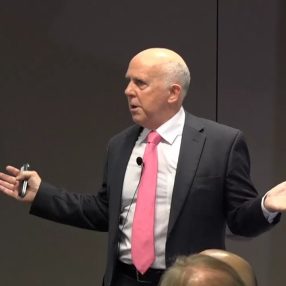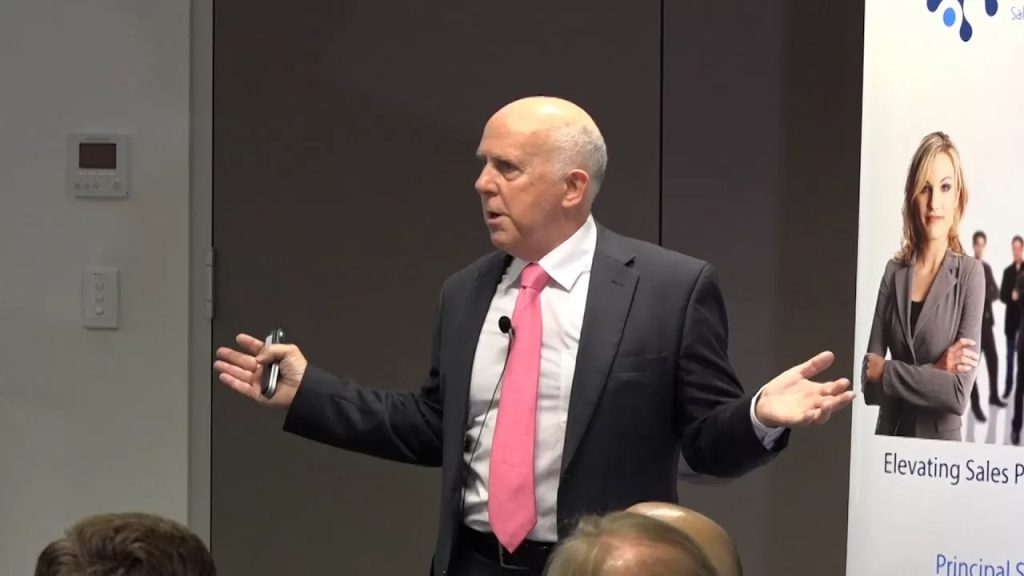
High Level Executive Selling Podcast Transcript with Steve Hall
Transcript of podcast interview with Steven Norman and Steve Hall
Steven: Steve is an expert on C-level selling, so that’s what we’ll be talking about today mostly. Steve, welcome to the show!
Steve: Thank you very much, Steven – great name you have there!
Do you and your team want to master the art of high-level executive selling? A must listen for anyone selling high value or business-critical solutions.
Steven: Thank you – you too! Steve, you’re an expert with a lot of experience around selling at C-level, so I really want to get into that subject. The first question I’ve got is why would we be selling at C-level? What are the benefits of doing that?
Steve: Great question, Steve. There’s a number of benefits, and let me give you an example of what’s not selling at C-level can do to you, depending on what you mean by C-level of course. Back in 2007, I was living in Paris working as a global account manager, I was working on two international deals with the two largest publishers in the world. At one of them, they’d been my customer in Australia for many years, and I was dealing at executive level in multiple countries: we were implementing the software throughout Asia and I was on the steering committee, I was looking after our implementations in South Africa and Australia and New Zealand, and I was connected with their various vice-presidents in their offices in New Jersey, and I was trying to sell them our software throughout Europe. Working with my coach and with the people I knew, I dealt with the COO of the entire company, I dealt with the CIO, the executive teams in Spain and Germany and Poland and France, and the end result was that after two years working on the deal, I closed the deal – I mean, we closed the deal; it’s a team effort – and that made me the leading salesperson in the company for that year, which was great.
Now, what it also meant was that I got onto the top commission level, and if I were able to close the other deal I was working on with the second largest publisher in the world, I’d been doing quite well. Now, the second deal was very different, I’d always dealt through the international CIO, and the international CIO was the CIO of everywhere outside the USA, but the USA dwarfed the rest of the world, and this was to sell our software to everywhere in the world except the USA where they didn’t already use it. And this guy and I, we’d known each other for a long time, we dealt together well, we had a good relationship, and he’d bought my software in a number of countries; on one occasion, I sold him a module of a quarter of a million dollars in a 10-minute phone conversation when I was on the Tube, so that was great. But, because I’d always dealt through him, and because he held things to his chest, I didn’t have any relationships with the C-level executives in the USA.

Now, with a month to go, we’d agreed the contract, we’ve agreed the amount of money, we’d agreed on everything, we just had to get the contract signed. All of a sudden, that company lost $50 million in a totally unrelated area, and the CEO in the States said, “That’s it, no more spending on IT this year,” and the deal had gone and there was nothing I could do about it! My connection wasn’t going to go up against his president and battle for my commission; he just accepted it, and so I had no way to appeal. That cost me at least $310,000 in commission! So, one reason is that if you’re not talking to the people at the top, and they’re the ones that make the decisions, they can kill a deal in an instant, for reasons that have got nothing to do with you.
I’ll give you another example. I’ve got a client here that sells neurology machines, machines for neurologists, quite expensive ones. They’ve got a new machine out, and neurologists love their machine, but they’re having difficulty closing deals, or they had been having difficulty closing deals, because the people that make the decisions don’t look at which is the best machine for neurologists; they look at should they spend the budget on neurology or cancer treatments or building a new building. So the conversation you have with the top of a hospital is different to the conversation you have with neurologists, and therefore you need to be talking at both levels to get the deal through.
Steven: You’re make the point about our projects competing with other projects. I think that’s really profound. Is that something you’re seeing becoming more common these days, and something that we have to be prepared to deal with?
Steve: Well, that’s two questions. Is it more common these days? No, I don’t think so. I think companies have always had more than one problem at one time, and they’ve always had to decide on their priorities and where they allocate their money. I mean, our biggest competitor is always… So many people say, “Our biggest competitor is do nothing,” but it’s not; it’s do something different, it’s spend the money somewhere else. I mean, I’ve lost deals in the past to warehouses. I was selling ERP software, but the company decided to build a warehouse instead. They didn’t buy a competing ERP, but they said, “No, we’re not going to change our software this year. We’re going to build a new warehouse, and then we’ll look at the software next year or the year after.” So it is an issue that you have to be aware of; you have to understand not just what the company’s pain is, but what their priorities are too.
I always use the example of a very simple problem that many companies have is they’re not selling enough. That’s a pretty basic problem, isn’t it, a lot of companies have that. Now, how can you solve that problem? You can solve that problem by hiring new salespeople, by sacking underperforming salespeople, you can change your pricing, you can discount, you can focus on selling more to existing customers, you can implement social selling, you can do sales training… There’s a whole heap of different ways to solve that one problem, and when the senior executives are discussing which strategic direction to go, if you’re not talking to them… If you’re someone that’s trying to persuade them to use account-based marketing, and they decide to buy a new CRM or do some sales training, it never became an opportunity, because you never had a chance to influence them.

Steven: Are there circumstances where we shouldn’t be pursuing C-level selling, and are there circumstances where we should?
Steve: Well, I think the answer is obviously yes. If you can save Telstra half a million dollars, you don’t talk to the CEO of Telstra, because half a million dollars, he spends that on lunch! So it’s got to be proportionate. But if you’re selling something that helps… My rule of thumb is that someone has to sign off on it, and they should be aware of what they’re signing off on and you should be talking to them. Because it’s so easy to see a line item in a balance sheet, and say, “Hey, what’s this million dollars we’re spending?” or $500,000 or however much it is, and just strike it out, without understanding what it’s for. People make arbitrary decisions all the time.
So, if the question is “I don’t want to rock the boat,” the answer is someone is going to rock it for you eventually, so you’re better off rocking it yourself and under your own control.
Steven: Yes. So you probably should be seeking the C-level discussion or C-level introduction. I guess then it’s a matter of what you’re talking about and how you’re positioning yourself so you’re not going to be cancelled out.
Steve: Well, it’s interesting. Because I have a client, they sell software that takes purchase orders and customer orders, and they read them and put them into SAP and other ERPs, and makes it much faster to put things through, it’s much more accurate. It’s good software, but it’s only a small part of a company’s business, and the COO said to me, “Look, there’s no point us talking to the people at the top, because we’re only a small bit of software,” and I said, “You may only be a small bit of software, but every single order that that company takes goes through you. So you’re going to go to the CEO and say, ‘We are a critical part of every single order that you do.’” So it’s a question of how you position yourself. It’s like saying, “We’re only a small steering wheel,” but without a steering wheel, the car is not much use.

Steven: How do we get the attention of a C-level person or the CEO of a company?
Steve: First of all, there’s two separate situations. There’s one where you’re already a supplier and you want to go up the food chain, and the other is when you’re trying to get into someone initially, and they’ve both got their challenges. When you’re already a supplier, they’re already a customer, you can often find yourself being blocked by people in between you and the person at the top. So then you need different strategies, and the ideal strategy then is that you need to do a peer-to-peer approach. In other words, if you’re a salesperson working at a lower level, and the person at the lower level is blocking you from going above them, you can bring in your own managing director or CEO and get them to approach them at a higher level. So that’s a way in an existing customer, and there’s always ways to do it. You basically say, “I want to talk to you, to see how we can make it easier to do business with us, see how we can improve what we do, see how we can provide you with an additional service…” there are ways to do that.
It’s obviously more challenging when you are looking to get into an organisation, and then you have to start looking at a strategy, and the strategy depends upon the company that you’re trying to approach and the person that you want to get to. My philosophy is, if at all possible, start at the top, start with the managing director or CEO. So then the question becomes which companies are we going to approach? Because everyone has got a lot of prospects, or theoretically at least. Which companies are we going to approach, and which people are we going to approach in those companies? If we look at which companies we’re going to approach, everyone should have an ideal customer profile, they should know that “Our ideal customer is this size, in this geography, usually in these industries…”
Now, people sometimes say to me, “Well, anyone can buy our software or anyone can use our service. So why would I specialise in an industry?” I was talking to a guy in the States a while back, and I said to him, “What’s your territory?” and he says, “Well, all of the USA,” and I said, “Well, what type of company specialises in this?” and he said, “Well, anyone with more than 500 seats,” because we were selling SaaS software. And I said, “Well, I’m going to guess there’s at least 30,000 of them,” and he says, “Yeah, probably,” and I said, “There is no way in the world that you can handle 30,000 prospects. Why don’t you pick the top 50 in New York, where you live, or in a particular industry? Pick an industry you know really well, pick a geography that’s convenient, and go out and look at them. Because you can’t approach more than 50 in a period of time anyway, not directly.”
…We leave the interview there for now. Follow the link below to listen to the full 47 minute podcast.
Listen to the complete Podcast with Steve Hall.
Leave me your comments!



